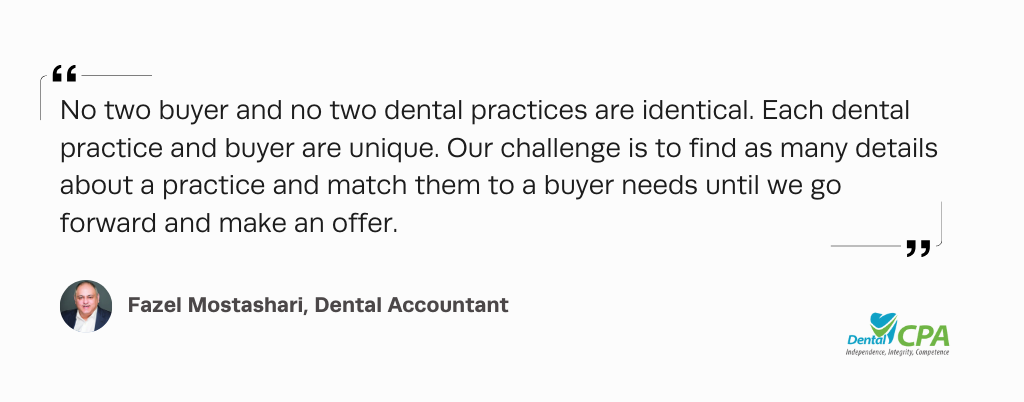Purchasing a dental office is likely one of the most important decisions of your career. The process involves a mix of financial and non-financial factors and understanding how to proceed is important for effective decision-making. In this guide, I’ll walk you through key points to consider when buying a practice.
Common Valuation Methods
As the spouse of a dentist and a financial expert, I spent years asking industry professionals—buyers, sellers, brokers, bankers, and accountants—about the best way to value a dental practice. After studying business valuation methods and taking the ABV (Accredited in Business Valuation) course, I developed my own approach.
Here are some common ways experts suggest valuing dental practices:
- 70% of total collections (minus cash collections)
- 60-80% of last year’s collections
- 2-3 times the net income
- A mix of collections, new patients, and equipment value
Well, let me stop at this point with all of these so-called methodologies which might not make sense to you. In my opinion, after reviewing over 500 offices, these are all incomplete descriptions of a very complex task. None of these completely and accurately describes this task. Before I get to the actual description of dental office valuations, I need to write a bit about what I usually observe while a practice sale/purchase is going through (Or Not).
The Power Imbalance: Sellers vs. Buyers
Sellers generally have the upper hand in these transactions. Here’s why:
- They have years of industry experience.
- They hire brokers (who take a commission of 8-12%) to represent them.
- They can afford legal and financial experts to assist in the process.
On the other hand, buyers—often new dentists—face challenges like:
- Lack of representation.
- Limited financial resources.
- Less time to thoroughly evaluate the deal.
If the deal goes through, everyone benefits except, potentially, the buyer, who could be left with a bad practice and a significant loan.
Avoiding Bad Deals: The Importance of a Personalized Approach to Dental Practice Valuation
Let’s talk about avoiding bad deals. When it comes to buying a dental practice, you have to be patient, thorough, and well-informed. I’ve seen plenty of clients walk away from bad investments just by taking their time. Yes, it can take months, maybe even years, but the more you know about the practice, the better your decision will be in the long run—both for your bank account and your career.

Now, here’s the tricky part: there’s no single, foolproof way to value a dental office. You’ll hear different things from different people—sellers, brokers, accountants. Each one has their own spin, usually driven by their own interests. Sellers? They’ll often slap a high price tag on their practice, hoping to cash out big. Buyers and lenders? They’re more cautious, focusing on risks that the seller conveniently forgets to mention.
It’s not as straightforward as buying a house. There’s no handy MLS system for dental practices, so you’re not going to find a neat little database with sale prices to compare. That’s why taking the time to study the financials and the inner workings of the practice is absolutely crucial before you make any moves. Also, it’s important to consider your personal situation. What might look like a golden opportunity to one buyer could be a total disaster for someone else. Your needs, your goals—those are the things that will dictate whether a practice is a good fit for you or not.
In the end, patience, asking the right questions, and leaning on trustworthy pros will keep you from falling into bad deals and help you find the dental practice that’s the perfect match for you.
The Buyer’s Perspective: Finding the Right Fit
As a buyer, your focus should be on what we call “investment value.” This means determining how valuable a practice is to you based on your specific needs and plans. A practice might be worth $300,000 in fair market value, but its value to you could be higher or lower.
Every buyer and practice is unique. Our job is to find out as many details as possible to match the right buyer with the right practice.
Due Diligence: What to Look For
Our due diligence starts with an evaluation of the information that the sellers and brokers are willing to provide before an offer is made. We take a look at the location, revenues, insurance revenues, types, expenses, procedures that are provided, rent, selling doctor’s profile, and all and any other items and public information that can be evaluated.
This process already eliminates most offices before even a further step is made. We try to find out if the production and expenses can be duplicated, will decrease, or if our buyer is able to expand and add additional services. In some of the practices, there might not be much dentistry left to be done on the current patients. Some might not have any room to grow due to the seller already providing all specialty services, especially if the Buyer does not personally provide these dental services.
Additionally, a good office lease is critical. Before any offer is made, it’s evaluated if annual rent expenses would even allow for building a profitable office. Rent Expenses should be preferably about 5-7% of annual revenues and not exceed 10-12%. Later after the offer is accepted and the buyer goes through its due diligence, an attorney should definitely be retained to take a much thorough review of all lease terms.
There are many other factors that must also be considered, such as location, equipment, appearance, staff, longevity, reputation and reviews, patient mix, procedures performed, growth trend, parking, visibility, and any and all available information. The main question is whether production and profitability will be continuing for the buyer.
Key Factors to Evaluate
Besides finances, several other factors play into the success of a dental practice:
- Equipment quality.
- Patient demographics.
- Staff experience.
- Office location and appearance.
- Growth potential.
Your main question should always be: Will the production and profitability of the practice continue once you take over?
To accurately value a practice, review the following:
- Equipment valuation. Typically, this should be performed by an independent dealer. The present value of all usable clinical supplies and hand instruments should be assessed, as well. In addition, does the practice owner or lease the equipment?
- A detailed physical description of the office, including, by way of example, the number of operatories. Does the selling dentist own the underlying real estate?
- A production and collections report and a breakdown by each dentist and hygienist.
- An accounts receivable and aging report. In addition, what percentage of the accounts receivable is actually collected? Further, compare the aging report to the production/collection reports to verify that these reports are consistent and accurate.
- A description of any contractual relationships of the patients, employers, or, insurance companies including HMOs, PPOs, DMOs, and capitation plans.
- A breakdown of practice expenses for insurance, retirement benefits, employee benefits, payroll taxes, medical reimbursement, telephone expenses, and continuing education. How much does it cost to run the practice?
- The total number of active patients and the number of new patients per month. This number will help the dentist and his/her advisors estimate an expected amount of cash flow for the practice. If the target practice is a specialty practice, a list of referring dentists would be extremely helpful. Where do new patients come from?
- How much revenue is based on insurance reimbursements?
Next Steps: Consult with a Professional
Buying a dental practice can be a daunting process, but you don’t have to go through it alone. We offer free consultations to help dental professionals navigate these complex transactions.




